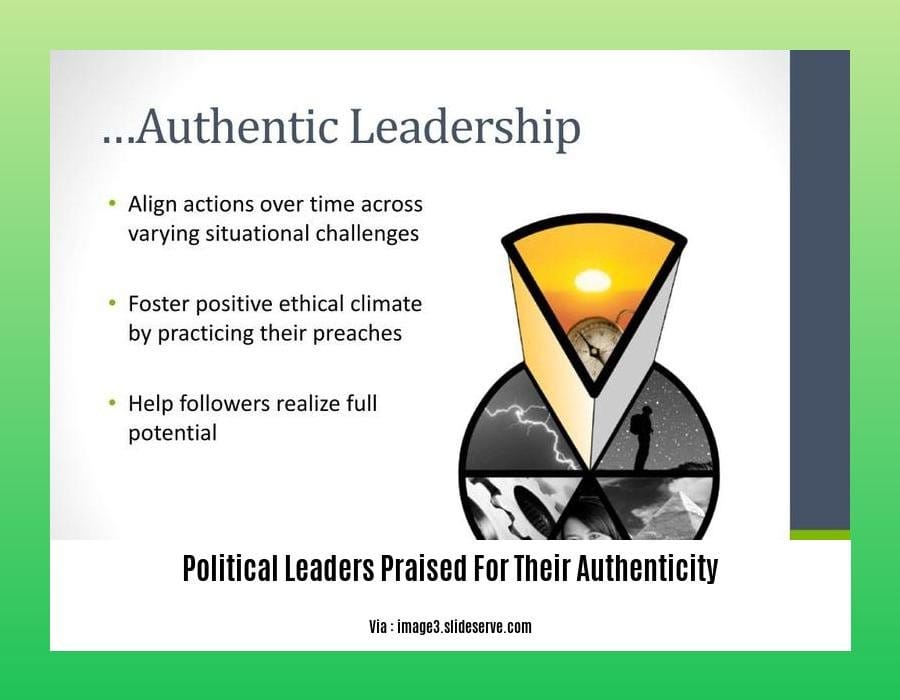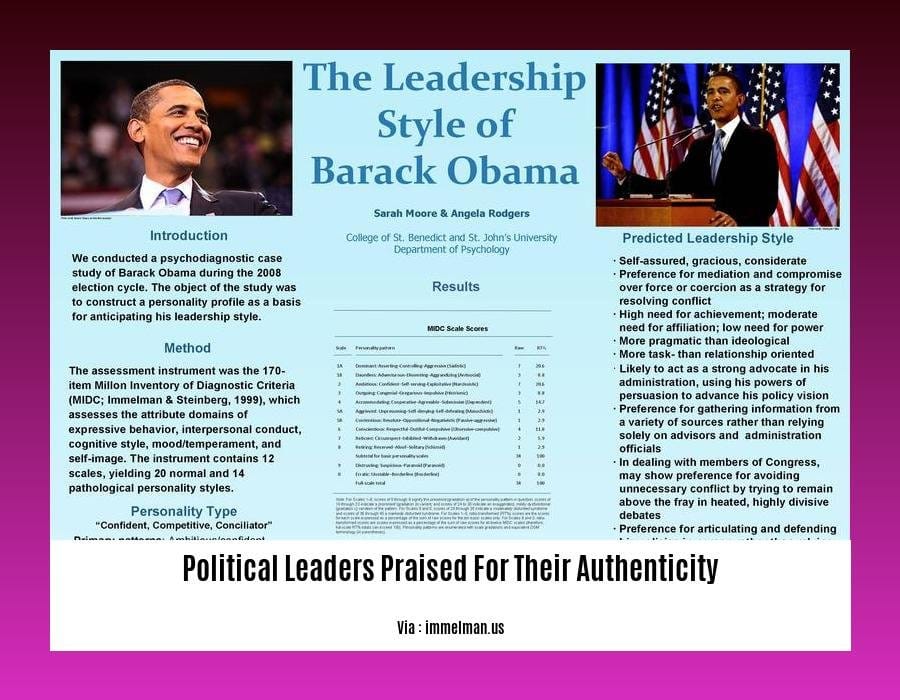Political Leaders Praised for Their Authenticity: Unraveling the Secrets of Trust-Building Leadership

Key Takeaways:
- Authentic communication fosters trust and accountability between leaders and citizens.
- Media coverage shapes public perceptions of leaders’ authenticity.
- Sincere interactions establish a foundation for trust.
- The definition of authentic leadership may need to be refined to differentiate it from everyday individuals.
Political Leaders Praised for Their Authenticity
Have you ever wondered what sets authentic political leaders apart? In this digital age, where every word and action is scrutinized, authenticity has become a priceless commodity. Political leaders praised for their authenticity possess a unique ability to connect with voters on a personal level, building trust and fostering positive political outcomes.
What is Authenticity in Politics?
Authenticity in politics is more than just being yourself. It’s about being true to your values, even when it’s unpopular. It’s about communicating with sincerity and empathy, and it’s about being consistent in your words and actions.
Authentic leaders don’t try to be someone they’re not. They embrace their strengths and weaknesses, and they’re not afraid to show their vulnerability. They’re transparent about their motivations and they’re willing to listen to feedback.
Why Authenticity Matters
In today’s political climate, authenticity is more important than ever. Voters are tired of the same old empty promises and political rhetoric. They’re looking for leaders who they can trust, leaders who are willing to fight for what they believe in.
Authentic leaders inspire trust and confidence. They’re seen as being genuine and honest, and they’re more likely to be believed when they speak. This trust can translate into votes, and it can also lead to more effective leadership.
How to Be an Authentic Leader
Being an authentic leader is not easy. It takes courage, self-awareness, and a willingness to be vulnerable. However, the rewards can be great. Authenticity can help you build trust, connect with voters, and achieve your political goals.
Here are a few tips for being more authentic in your leadership:
- Be yourself. Don’t try to be someone you’re not. Embrace your unique strengths and weaknesses.
- Be honest and transparent. Communicate with sincerity and empathy. Be open about your motivations and be willing to listen to feedback.
- Be consistent. Be true to your values, even when it’s unpopular. Don’t say one thing and do another.
- Be vulnerable. Don’t be afraid to show your vulnerability. This will help you connect with voters on a personal level.
Examples of Authentic Leaders
Throughout history, there have been many political leaders praised for their authenticity. Here are a few examples:
- Nelson Mandela: Mandela was a South African anti-apartheid revolutionary, political leader, and philanthropist who served as President of South Africa from 1994 to 1999. He was known for his authenticity, his courage, and his commitment to reconciliation.
- Barack Obama: Obama was the 44th President of the United States. He was known for his intelligence, his charisma, and his ability to connect with people from all walks of life.
- Jacinda Ardern: Ardern is the Prime Minister of New Zealand. She is known for her empathy, her compassion, and her strong leadership during the COVID-19 pandemic.
These are just a few examples of political leaders praised for their authenticity. Their stories show that authenticity is a powerful force in politics. When leaders are genuine, honest, and true to themselves, they can achieve great things.
Admiration often goes to most genuine and real political leaders who are not afraid to show their true selves. These leaders admired for being true to self don’t change who they are depending on their audience. Authentic personalities among leaders are praised for their honesty because they are not afraid to stand up for what they believe in, even if it’s not popular.
They follow a moral compass
Great leaders are driven by a strong moral compass that guides their decisions and actions. They are committed to doing what is right, even when it is difficult or unpopular. They are honest, ethical, and fair. They lead by example and inspire others to do the same.
Key Takeaways:
- Authentic leaders are guided by a strong moral compass.
- They are committed to doing what is right, even when it is difficult or unpopular.
- They are honest, ethical, and fair.
- They lead by example and inspire others to do the same.
Citation:
– The Conversation: Open, Honest and Effective: What Makes Jacinda Ardern an Authentic Leader?
They are open and honest
Authentic leaders cultivate trust by fostering vulnerable relationships. They courageously share their thoughts and emotions, inviting reciprocal vulnerability from their constituents. By leading with open hearts and unwavering commitment to their values, they create an environment where authentic connections thrive.
Benefits of Open and Honest Leadership:
- Trust: Transparency fosters trust, creating a solid foundation for leadership.
- Communication: Honesty establishes open channels of communication, enabling effective dialogue.
- Resilience: Authenticity builds resilient leaders capable of navigating challenging situations.
Key Takeaways:
- Authentic leaders embrace vulnerability, encouraging open and honest communication.
- Transparency and integrity are cornerstones of establishing trust.
- Honesty and authenticity foster resilience and effective leadership.
Relevant URL Source:
- Authentic Leadership: The Key to Building Trust and Inspiring Followers

FAQ
Q1: What are the key characteristics of authentic leaders?
A1: Authentic leaders are self-aware, possess a moral compass, and practice open and honest communication.
Q2: How does authenticity distinguish itself from callousness?
A2: Authenticity considers ethical norms and the impact of one’s actions on others, while callousness does not.
Q3: What are the benefits of authentic leadership?
A3: Authentic leadership attracts and retains followers, fosters trust and open communication, and enhances resilience and performance.
Q4: How do authentic leaders demonstrate self-awareness?
A4: Authentic leaders understand their strengths, weaknesses, and values, and make principled decisions based on that understanding.
Q5: Why is it important for authentic leaders to follow a moral compass?
A5: Adhering to a moral compass allows authentic leaders to make decisions that align with their values, even when faced with difficult choices.












